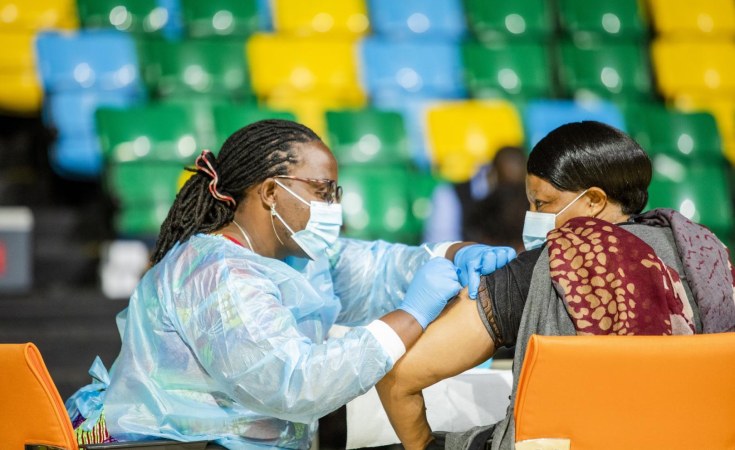Johannesburg — The WHO's member states agree that for peace to prevail in conflict affected places, good medical assistance and health resources should be available for all. Some suggested approaches include that the WHO programmes should achieve both health and peace dividends at the country level by mainstreaming the Health for Peace approach.
And thus the Global Health for Peace Initiative was discussed at the the 75th World Health Assembly (WHA) in Switzerland, where delegates requested re-elected Director-General Tedros Adhanom Ghebreyesus consults all members to find a way forward for the implementation of WHO's report on the new Initiative.
The first in-person Health Assembly since the start of the Covid-19 pandemic was held from 22-28 May, 2022 with the theme of Health for Peace, Peace for Health.
Speaking on behalf of the 43 WHO Afro members, the delegate from Sierra Leone says there is a need to establish universal health coverage as it will align with the WHO activities under the Thirteen General Programme of Work 2019 - 2023, targeting the triple billion.
One example of the WHO Health for Peace interventions is the psycho social and mental health for conflict affected youth in Somalia from 2020. WHO developed a training curriculum and organized training sessions to educate some 80 health workers who can deliver improved Mental Health and Psycho-social Support Services (MHPSS) to local populations suffering from mental health issues brought on by acute and protracted conflicts. This initiative Targeted vulnerable youth in conflict-prone settings, the community-based MHPSS aimed to reduce stigma at community level and make the youth actively engage in activities that promote social cohesion.
"The African region supports the Global Health for Peace Initiative that are relevant to both the success of the health programmes and the importance of peace including equity, inclusiveness, participation, local ownership or leadership and context specific seasons. The African region is convinced that there will be no health without peace and no health without peace," the WHO Afro representative said.
The Thirteenth General Programme of Work (GPW 13) defines WHO's strategy for the five-year period, 2019-2023. It focuses on triple billion targets to achieve measurable impacts on people's health at national level.
"We would also like to acknowledge the involvement of the WHO regional office for Africa since the launch of the global health for peace initiative in 2019 in Geneva, in this context several countries have submitted projects on health and peace to the UN Peacebuilding Fund, notably Cameroon and Burkina Faso. The African region looks forward to the finalisation and availability of the practical guide held for peace manual which will help apply the health for peace approach." he said.
The African region will continue to support offices and units of WHO that effectively promote public health norms as well as those that support national health ministries, implementing programmes that are conflict sensitive and contribute to peace dividend in fragile conflict affected and vulnerable areas," he said.
Members also heard from international organizations affiliated with the WHO including the International Federation of Medical Students Association (IFMSA) and the International Council of Nurses (ICN.
"IFMSA recognised the interdependence of peace and health and emphasizes the promotion of peace through provision of care, the promotion of community health and the shaping of equitable policies. Multi and intersectoral partnerships are key for addressing urgent health issues and preparing for future ones, as evidenced in several experiences such as the influenza preparedness plans and as such is crucial to end up in peace through health," said Iris Blom, a Medical Doctor and IFMSA's Liaison Officer to the WHO.
She says IFMSA strongly supports the engagement of youth in promoting peace responsive health programmes and equitable policies that strengthen social justice.
"IFMSA calls on member states to respect the humanitarian principles of humanity, neutrality, impartiality and independence guiding the healthcare profession and refrain from acts of violence against it and capacitate a future health workforce with the competencies to promote multicultural peace through their practice", said Blom.
Nurse & CEO of International Council of Nurses, Howard Catton highlighted his organisation's initiative dubbed Nurses for Peace Initiative supported by nurses around the world and the global nursing solidarity and humanitarian support in response to the invasion of Ukraine.
"On behalf of all the 28 million nurses world wide, we believe that health and well being are the bedrock to safety and security and that peace and health are inseparable. The values of the nursing profession such as justice, respect, equity, human rights and compassion are all foundations of peace and by upholding these in their everyday practice nurses are influencers of peace, peace diplomacy and peace building. As trusted members of their communities nurses can greatly contribute to strengthen and operationalise the link between health and social cohesion and peace. Nurses working on the front lines in fragile conflict and vulnerable settings deliver care that is centered on neutrality, reconciliation and healing," he said.
The WHA requested for the development of a roadmap in full consultation with Member States, Observers, other United Nations agencies and relevant non-State actors in official relations with WHO which will be put forward for consideration in 2023 by the 76th World Health Assembly through the 152nd session of the Executive Board.
AllAfrica is grateful to the Carnegie Corporation of New York for supporting our reporting on peacebuilding in Africa.


